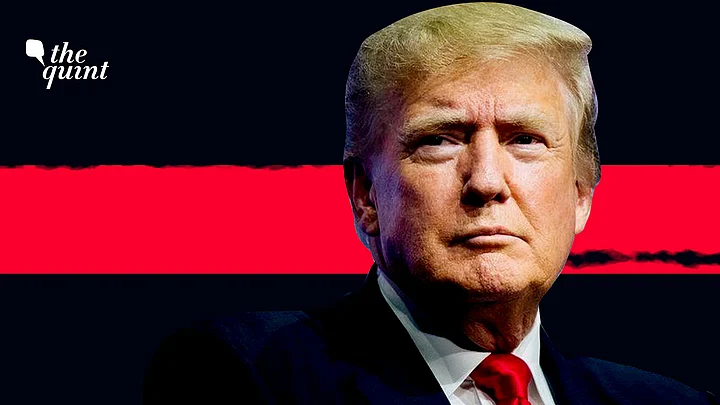(This story was originally published on 24 January 2025. It has been republished in light of the US Supreme Court ruling to restrict the powers of federal district courts to block the US government's policies on birthright citizenship.)
In a flurry of Executive Orders that US President Donald Trump issued upon assuming office, one called for ending birthright citizenship.
Most legal scholars have argued that this violates the 14th Amendment to the US Constitution which had guaranteed the principle. In an 1898 Supreme Court case, The United States versus Wong Kim Ark, the principle had been upheld. In effect, any child born on American soil, regardless of the legal status of their parents, can claim citizenship in the country.
There are only two exceptions to this law: it does not apply to the children of enemy aliens or those of foreign diplomats.
The decision, based on one of Trump's many campaign promises, has been greeted with considerable dismay among a range of immigrant communities. It will also, no doubt, result in a spate of legal challenges.
Already the attorney generals of 22 states have sued the federal government from implementing this executive order. A federal judge, who has agreed to hear the case, has scheduled a hearing to issue a possible temporary restraining order. If the stay is granted, US law enforcement agencies would be unable to implement the order which is designed to go into effect on 19 February.
Trump’s decision to use (and very possibly abuse) the vast executive authority vested in the presidency to revoke birthright citizenship is hardly surprising.
Doubling Down on Anti-Immigrant Narratives
From his first term in office, he has been obsessed with illegal immigration, especially from the global South. To that end he made a series of inflammatory and dubious claims about the dangers that illegal immigrants pose to the body politic.
He has also falsely asserted that illegal immigrants are more prone to commit crimes. Reputable studies have shown that this statement is palpably false.
Despite this falsehood, such claims convinced a significant segment of the American electorate in the most recent election that brought him back to office. Of course, there may have been an element of a confirmation bias on the part of these Trump voters. They may have been inclined to believe that undocumented aliens were the source of many of their social and economic woes.
It is also important to highlight that for a segment of working class, non-college-educated Americans, the demographic shifts under way across the US has generated a nativist, xenophobic backlash. Trump, since his first presidential campaign, played upon these fears and reinforced their anxieties.
And, of course, both he and his then vice-presidential running mate, JD Vance, exploited the misgivings of Springfield, a small community in Ohio, which had seen an influx of mostly legal Haitian immigrants. Vance shamelessly spread the canard that the immigrants had brought disease, were on a crime spree and were eating cats and dogs.
When challenged about these scurrilous claims on the campaign trail, he admitted that he had made them up but argued that he needed to do so to garner media attention. The irony of Vance’s tactics could not be more transparent: His wife, Usha, is the daughter of Indian immigrants, albeit legal ones.
Fate of Indian-Americans Hangs in Balance
Despite Trump and Vance’s blatant anti-immigrant rhetoric and their promise to end birthright citizenship, a segment of the naturalised Indian American population voted for them. Their motivations, no doubt, were mixed.
Some of them, who are downright wealthy, probably found his promise to extend his 2017 tax cuts to be appealing. Many within the business community, who found a range of regulations that the Joe Biden administration had imposed, to be onerous and looked forward to a less regulated milieu under Trump.
In doing so, they probably overlooked Trump and Vance’s ugly anti-immigrant rhetoric and focused on the likely benefits that would accrue to them with the duo in office. Finally, they may have also calculated that a revocation of birthright citizenship would have no discernible impact on their lives or those of their children.
Growing Vulnerability
The anguish and fear that Trump’s Executive Order ending birthright citizenship has sown amongst substantial numbers of both legal residents with temporary work visas, and especially amongst undocumented aliens with children, is entirely understandable.
Those in the latter group, of course, are far more vulnerable as both they and their children could get easily swept up in the dragnet that Trump has released through another of his sweeping executive orders. The legal efforts on the part of several civil rights organisations to protect them from being deported may offer them some comfort but can hardly entirely assuage their very genuine anxieties.
As the legal challenges wend their way through the American judicial system, these individuals and their families will remain in a state of limbo fretting about the future in the country that had seemed like an immigrant haven.
(Sumit Ganguly is a Senior Fellow and directs the Huntington Program on Strengthening US-India Relations at the Hoover Institution at Stanford University. This is an opinion piece. The views expressed above are the author’s own. The Quint neither endorses nor is responsible for the same)
